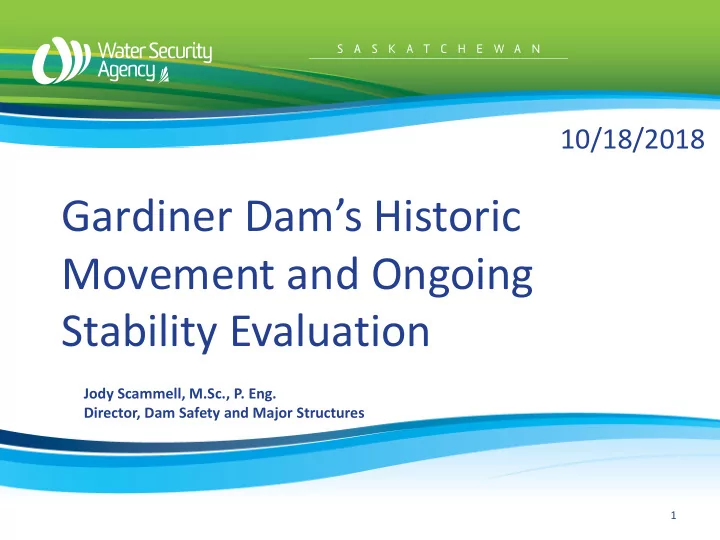

10/18/2018 10/18/2018 Gardiner Dam’s Historic Movement and Ongoing Stability Evaluation Jody Scammell, M.Sc., P. Eng. Director, Dam Safety and Major Structures 1
10/18/2018 2
10/18/2018 Outline • South Saskatchewan River Project Introduction • Lake Diefenbaker Reservoir • Gardiner Dam – Foundation Conditions – Major Components – Movements – Previous Stability Evaluations • Grant Devine Dam Stability Evaluation • Expected Results – Not expected results 3
10/18/2018 SSRP Introduction Gardiner Dam Qu’Appelle River Dam 4
10/18/2018 SSRP Introduction • 1894 first consideration for large irrigation • 1968 completed • Total cost $120 million (1968 value) • Replacement value $2.41 Billion • Owned and operated by Water Security Agency • Operation, maintenance and monitoring complete by 8 onsite staff 5
10/18/2018 Lake Diefenbaker Reservoir 6
10/18/2018 Reservoir Drainage Basin • Three Regions • Effective Distribution – Eastern Rockies 50% Area / 80% Flow – Foothills 50% Area / 20% Flow – Prairies • 60% Snowmelt • 38% Rainfall runoff • 2% Glacier melt 7
10/18/2018 Reservoir Operation • Runoff patterns – Low winter flow – Spring peak, April – Summer peak, May/June – Recession, Aug/Sept 8
10/18/2018 Reservoir • Lake Diefenbaker • 225 km long (near Eston, SK) • 760 km shoreline Volume 9.25x10 9 m 3 • Usable Storage 3.95x10 9 m 3 • • Up to 58 m deep 9
10/18/2018 2013 Release • Largest flow released 1600 m 3 /s spillway • 2000 m 3 /s total • 6000 558 Lake Diefenbaker April 1, 2013 to March 31, 2014 5000 556 4000 554 Elevation (m) Flow (m3/s) 3000 552 Inflow Outflow Elevation median 2000 550 1000 548 0 546 10
10/18/2018 Gardiner Dam 11
10/18/2018 12
10/18/2018 Gardiner Dam Main (River) Major Components Embankment Plateau Embankment Coteau Creek Embankment Tunnels Spillway 13
10/18/2018 Gardiner Dam Embankments • Three zoned compacted- Coteau Creek earth filled embankments Embankment • Total Length 5000 m • Crest Elevation 562.4 m • Max height 64 m • Upper Slopes 2H:1V • Lower Slopes 85H:1V Main (River) Plateau Embankment Embankment 14
10/18/2018 Gardiner Dam Foundation 15
10/18/2018 Gardiner Dam Foundation • Till • River Sand – Eroded except on – In valley bottom abutments • Bedrock – Bearpaw Formation – Snakebite Shale – Ardkenneth Sandstone 16
10/18/2018 Gardiner Dam Foundation • Snakebite Shale Description – Upper Cretaceous Origin – Marine Deposited – Dark Grey Shale, flat horizontal lying strata – Jointed, Slickensided, and Bentonite seams – Highly Plastic – Presheared 17
10/18/2018 Gardiner Dam Foundation 18
10/18/2018 Gardiner Dam Foundation 19
10/18/2018 Gardiner Dam Movement 20
10/18/2018 Gardiner Dam Horizontal Movement • Occurring since start of construction • Shear plane located in shale foundation near the contact with the underlying sandstone – Approximately 114 m below the crest of the dam El.448 m 21
10/18/2018 Gardiner Dam Horizontal Movement • Movement rates and magnitude vary by position from the dam crest • Maximum movement rate and magnitude is occurring at toe of main embankment 22
10/18/2018 Historic Instrumentation Horizontal Movement • The movement is occurring on a defined shear plane in the shale 23
10/18/2018 Gardiner Dam Horizontal Movement • Movement rate generally slowing • On an annual frequency the movement rates indicate a trend with the reservoir 24
10/18/2018 Historic Instrumentation Time Comparison • The piezometric level fluctuates with reservoir 25
10/18/2018 Previous Analysis • 1979 • 1948-1953 – Finite element stress – Limit Equilibrium deformation analysis – Total Stress Analysis – Computational limited • 1954-1965 • 1980-2009 – Limit Equilibrium – Simple mechanical – Effective Stress Analysis model with a spring and – Redesigned as the back damper to predict analysis of local slopes movement related to historic movement 26
10/18/2018 Previous Analysis • It appeared there is a • 2009-2013 correlation between total • Analytical Model stress loading on the shale • Simple sliding block and pore water dissipation. evaluation 27
10/18/2018 Previous Analysis Next Steps What does this all mean • Detailed Finite Difference • We don’t understand the Model (FDM) movement mechanisms • Understand long term • The stability of the structure deformations and impacts is not fully understood on structures 28
10/18/2018 Detailed FDM Analysis Moving Forward Grant Devine (Alameda) Dam 2011-2014 • Similar problem as Gardiner • Process will be very similar but was moving faster 29
10/18/2018 Detailed FDM Analysis Moving Forward • Stop construction to Grant Devine (Alameda) Dam redesign • Unanticipated shear • Added toe berms displacements during construction Glacial Till (Foral/Battleford) Formation) Bedrock – interbedded sandstones, siltstones and clay shales (Ravenscrag Formation) 30
10/18/2018 Detailed FDM Analysis Moving Forward Detailed Geological Framework • Need to understand the • Develop a representative materials in the foundation model 31
10/18/2018 Detailed FDM Analysis Moving Forward 32
10/18/2018 Detailed FDM Analysis Moving Forward Start with a 2D – Establish appropriate • 2D model is required to constitutive model of soil minimize complications • Once model behavior is • Calibrate model understood then move on to – Lab tested material 3D properties – Actual deformation measurements 33
10/18/2018 Detailed FEM Analysis Moving Forward Move forward with 3D • Start with properties from calibrated 2D model • Calibrate again – Actual deformation 3D FLAC Model measurements – Measured porewater pressure Oblique Section – Shear Strain Contours 34 Cut Along Oblique Section
10/18/2018 Expected Results • Limitations • Understanding of long term movements – Not expecting be able to estimate annual • Understanding of the displacement stability of the structure – A traditional Factor of • Estimate of total Safety is not possible deformation and rate • Impact on the ancillary structures – Spillway – Relief Well Drainage Conduit 35
10/18/2018 Summary • The dam is performing well • With over 50 years of satisfactory performance • Monitoring and there is valuable lessons to maintenance activities are be learned from this project ongoing • This project is a valuable • The embankment is moving asset to the province and downstream with rates will remain to be in the slowing future 36
10/18/2018 37
Recommend
More recommend